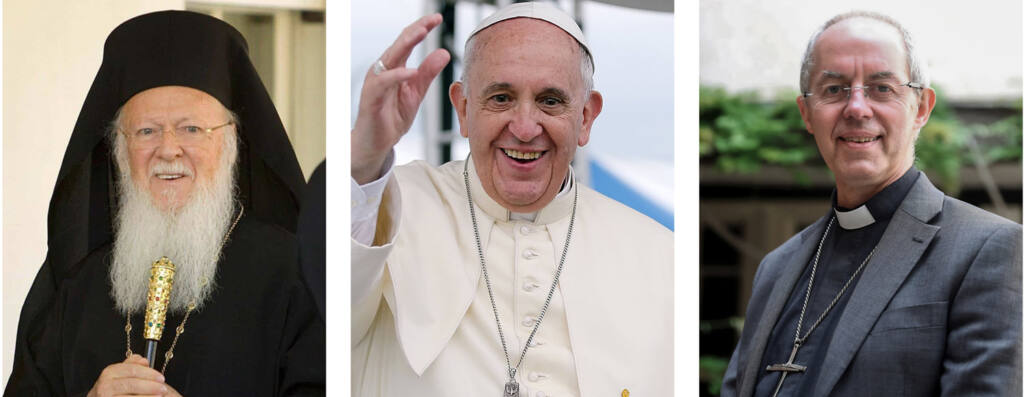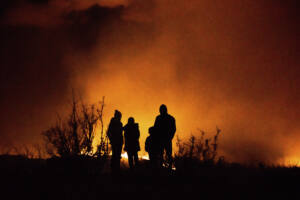WelCom September 2023
Season of Creation 2023: 1 September–4 October
Let Justice and Peace Flow
“But let Justice roll on like a river, righteousness like a never-failing stream!’ –Amos 5:24
Pope Francis has established 1 September as the World Day of Prayer for the Care of Creation, encouraging the Catholic community around the world to pray for our common home. The day is inspired by his landmark encyclical Laudato si’, which calls on ‘every person living on this planet’ to care for our shared Earth.
The Holy Father first instituted 1 September for this day serving as a way to encourage the faithful to pray for our common home. The annual day also marks the beginning of an ecumenical outreach bringing Christians to pray and work together in the Season of Creation, which lasts till 4 October, the feast of St. Francis of Assisi. The origins also go back to Ecumenical Patriarch Dimitrios who proclaimed 1 September as Creation Day for the Orthodox in 1989, followed by other Christian European Churches in 2001, and by Pope Francis in 2015.
Message of the Holy Father for the celebration of the World Day of Prayer for Creation
In his message for the 2023 World Day of Prayer for Creation, Pope Francis appeals for a renewal of our relationship with creation. Released on 25 May 2023, his message focuses on the theme, ‘Let Justice and Peace Flow’, inspired by the words of the prophet Amos: ‘Let justice flow on like a river, righteousness like a never-failing stream.’
The Pope begins by noting, ‘God wants justice to reign; it is as essential to our life as God’s children made in his likeness as water is essential for our physical survival.’
Recalling his apostolic journey to Canada in July 2022, and in particular his visit to the Indigenous People on the shores of Lac Ste Anne in Alberta, the Pope reflected on how so many of the people down through the ages have found ‘consolation and strength’ from these waters, likening the natural beauty there to the ‘maternal heartbeat of the earth’. And just as the heart of a baby in the womb beats in harmony with the mother, so also ‘we need to harmonise our own rhythms of life with those of creation, which gives us life’.
And decrying the fact too many of our brothers and sisters are prevented from drinking from that mighty river, the Pope says, ‘Let us heed our call to stand with the victims of environmental and climate injustice, and to put an end to the senseless war against creation.’
Pope Francis decries the greed and selfishness today that disrupts the planet’s water cycle. The threats to our planet and water sources are many, he notes: fossil fuels and the destruction of forests that contribute to climate change; the depletion and pollution of freshwater sources through extreme practices such as fracking or uncontrolled mega-mining projects and intense animal farming.
We need to act urgently, to create a more sustainable and just world, the Pope notes also referring to grave warnings from the United Nations Intergovernmental Panel on Climate Change. And he stresses it is possible to prevent the worst from happening if we all unite to come up with more sustainable ways to live now and for the future, and he reiterated that much can be done if we come together.
In looking especially at Christian communities, the Pope writes we can all contribute to change for good by ‘resolving to transform our hearts, our lifestyles, and the public policies ruling our societies.’
Transforming our hearts is a key starting point and this ‘ecological conversion’ involves ‘the renewal of our relationship with creation so we no longer see it as an object to be exploited but cherish it instead as a sacred gift from our Creator.’
Next, we need to change the way we live, he notes, and ‘starting from grateful wonder at the Creator and his creation… Let us adopt lifestyles marked by less waste and unnecessary consumption, especially where the processes of production are toxic and unsustainable.
‘Let us be as mindful as we can about our habits and economic decisions so all can thrive – our fellow men and women wherever they may be, and future generations as well,’ he says.
The things we can all do are many, he continues, such as using resources with moderation, recycling waste, using available products and services that are environmentally and socially responsible.
Finally, we need to look at our public policies, especially ‘economic policies that promote scandalous wealth for a privileged few and degrading conditions for many others,’ as they mean they gravely threaten peace and justice.
Issuing an appeal to make our voices heard to halt this injustice towards the poor and the future generations who will bear the worst effects of climate change, the Holy Father asked for action in conformity of these perspectives on society and nature.
Recalling the Synod on Synodality that will open its first session in October, just after the closing of the Season of Creation on 4 October, the Pope writes, ‘the entire People of God is being invited to an immersive journey of synodal dialogue and conversion.’
He upholds the strength of communion of countless local Churches, each of whom has a unique and irreplaceable contribution to make, and he prays that the Holy Spirit may guide our efforts to ‘renew the face of the earth’.
He concluded, that ‘our synodal Church must be a source of life for our common home and all its inhabitants…sowing justice and peace in every place it reaches.’
Sources: Vatican News; seasonofcreation.org

Season of Creation 2023: 1 Sept–4 Oct

The World Day of Prayer falls at the beginning of the Season of Creation, which runs until 4 October, the feast of St Francis of Assisi, the patron saint of ecology. It is an ecumenical season dedicated to prayer for the protection of creation and the promotion of sustainable lifestyles.
The theme for the Season of Creation 2023 is Let Justice and Peace Flow. An accompanying symbol of a mighty river has also been created, inspired from Prophet Amos’s quote, ‘But let Justice roll on like a river, righteousness like a never-failing stream!’ (Amos 5:24). Together, the 2023 theme and symbol call for everyone to ‘join the river of justice and peace, to take up climate and ecological justice, and to speak out with and for communities most impacted by climate injustice and the loss of biodiversity’.
‘Listen carefully, I am about to do a new thing, now it will spring forth; will you not be aware of it? I will even put a road in the wilderness, rivers in the desert.’ – Isaiah 43:19
The Season of Creation is a time to renew our relationship with God our Creator and all creation. Caring for creation is living out our Catholic faith. The Church, following the teachings of Jesus, throughout time has exhorted believers to work for the common good, which calls for dignifying life in all its forms, caring for our common home, and committing to the construction of more just, supportive, fraternal and peaceful societies.
Individuals and communities are invited to participate through prayer, sustainability projects and advocacy.
For more information and resources visit: laudatosimovement.org/season-of-creation/ and seasonofcreation.org
‘Era of global boiling has arrived’

The era of global warming has ended and ‘the era of global boiling has arrived’, the UN secretary general, António Guterres, said after scientists confirmed July 2023 was set to be the world’s hottest month on record.
‘Climate change is here. It is terrifying. And it is just the beginning,’ Guterres said. ‘It is still possible to limit global temperature rise to 1.5°C [above pre-industrial levels] and avoid the very worst of climate change. But only with dramatic, immediate climate action.’
Global temperatures in July shattered records, according to the World Meteorological Organisation (WMO) and the EU’s Copernicus Earth observation programme, stoked by the burning of fossil fuels and spurring violent weather.
The steady rise in global average temperatures, driven by pollution that traps sunlight and acts like a greenhouse around the Earth, has made weather extremes worse.
‘Humanity is in the hot seat,’ Guterres told a press conference. ‘For vast parts of North America, Asia, Africa and Europe, it is a cruel summer. For the entire planet, it is a disaster. And for scientists, it is unequivocal – humans are to blame.
‘All this is entirely consistent with predictions and repeated warnings. The only surprise is the speed of the change. Climate change is here, it is terrifying, and it is just the beginning. The era of global warming has ended; the era of global boiling has arrived.’
Guterres urged politicians to take swift action. ‘The air is unbreathable, the heat is unbearable, and the level of fossil fuel profits and climate inaction is unacceptable. Leaders must lead. No more hesitancy, no more excuses, no more waiting for others to move first. There is simply no more time for that.
‘It is still possible to limit global temperature rise to 1.5C and avoid the very worst of climate change but only with dramatic, immediate climate action. We have seen some progress – a robust rollout of renewables and some positive steps from sectors such as shipping – but none of this is going far enough or fast enough. Accelerating temperatures demand accelerated action.’
Source: UN News; The Guardian
‘It’s what we know together that will solve the crisis’
Catherine Gibbs
Laudato si’ is Pope Francis’ letter to the world. Published in 2015, it resonates with people of many faith traditions because it calls for the moral value of care. It continues to transform millions of lives and to inspire people both inside and outside of the Church to commit to a life of care for creation and for our vulnerable sisters and brothers.
Laudato si’ encourages us to see how everything is connected. The way we treat the Earth, our common home, is a reflection on how we treat one another. Caring for each other means caring for the home we share. The most vulnerable of our sisters and brothers are burdened with the worst impacts of the ecological crisis. We are called to hear both the cry of the earth and the cry of the poor and to respond.
Last year the Vatican released a documentary film called The Letter. The Catholic Church was reaching out to serve humanity in bringing together science and faith to face the crisis on our planet – rapid climate change and biodiversity loss. Building on Laudato si’ the documentary shares the real stories of five people from around the world who come together on a transformative journey to Rome and beyond using the ‘Pope’s media megaphone’.
The five non-Christian voices represent expressions, not often heard, through the stories of: a young adult from Senegal – voice of the poor; a chief from Brazil – voice of indigenous peoples; a teenager from India – voice of youth; and two scientists from Hawaii – voice of wildlife.
The Letter uses statistics to wake us up to the crisis we face. For example, 1.2 billion people will be displaced by the effects of climate change by 2050. Indigenous communities are stewards of 80 per cent of biodiversity.
I urge each of you to view The Letter at theletterfilm.org for the following reasons. You can organise a screening in your parish.
• Understand the relationship between ecology and evangelisation – Pope Francis calls on ‘all people of good will’ to undergo an ecological conversion, ‘whereby the effects of their encounter with Jesus Christ become evident in their relationship with the world around them’ (LS 62, 217). We can discover God in the beauty of creation and in the sighs of the sick, aware the life of the Spirit is not disassociated from worldly realities. This will help us to ‘overcome individualism [and] develop a different lifestyle to bring about significant changes in society’ (LS 208).
• Consistently support the call to build alliances – our response to the climate crisis is an exercise in human relations – internationally, nationally and locally. Scientist Greg states: ‘It’s not what I know and what you know. It’s what we know together.’
• The true nature of hope as agency – we create hope by creating meaning. The documentary visually enhances the meaning of Laudato si’ through storytelling. We can ‘see and hear’ the cry of the poor, the young generation and the creatures we share our home with. We gain insights into how technologies can provide key information to help us understand what is happening.
• Touching the sacred – The Letter shows the beauty of nature ‘where the veil between heaven and earth is gossamer thin’. We are re-introduced to St Francis’ ‘Praised Be’ prayer providing a transcendent reason to care for all creation.
I’m on this challenging journey and I invite you contact me at cmgibbs543@gmail.com if you would like any help with your own journey of eco conversion.
Catherine Gibbs is co-director of the National Liturgy Office and a member of Te Awakairangi Catholic Parish, Lower Hutt.
Pope updating Laudato si’
Pope Francis is writing a second part to his 2015 environmental encyclical Laudato si’ to cover current issues. He announced this intention at the Vatican at the end of a speech on 21 August 2023 to lawyers from the Council of Europe member states that signed the Vienna Declaration on the Support of the Rule of Law in 2022.
Thanking the lawyers for their care for the common home and their advocacy of environmental protection laws, the pope announced he was writing another document on the environment. He provided no further information.
‘It must never be forgotten,’ he said, ‘that future generations are entitled to receive from our hands a beautiful and habitable world, and that this entails grave responsibilities toward the natural world that we have received from the benevolent hands of God.’
Source: CNA, CathNews Australia